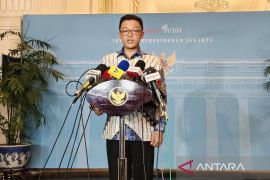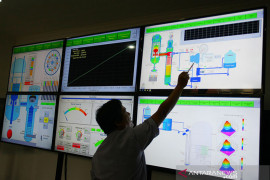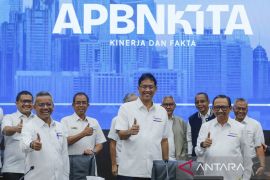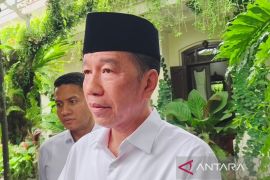According to State Enterprise Minister Mustafa Abubakar, right now the operational expenditure of all SOEs is bigger than their capital expenditure.Jakarta (ANTARA News) - State-owned enterprises (SOEs), as one of the country`s economic pillars beside private companies and cooperatives, are playing an increasingly significant role in national economic development through their upward performance and financial contributions to the state.
The increasing role of state-owned companies is reflected in their performance which has been improving steadily, as well in their financial contributions to the state which in 2010 stood at Rp132.6 trillion (in the form of dividends, taxes and privatization).
Besides, state-owned firms in 2010 also made indirect contributions to national development in the form of capital expenditure worth Rp197 trillion and operational expenditure valued at Rp932 trillion.
Therefore, to increase their contribution to national development, their capital expenditure would be further pushed up. The government through the Ministry of State Enterprises (BUMN) is ready to push state firm to increase their capital expenditure to the level of Rp380 trillion in the next four years.
Coordinating Minister for Economic Affairs Hatta Rajasa said the BUMNs` capital expenditure in 2011 would reach Rp380 trillion which would go to business expansion to meet the needs for an economic corridor development program.
However state companies that are just conducting restructuring certainly would not be forced to increase their capital expenditure but those that have been healthy and have the potential to rise would be encouraged.
Hatta Rajasa said he was optimistic there would be a leap in the growth of capital expenditure of the BUMNs in line with their increasing financial performance. "The potential to raise capital expenditure may be gained from reduction of operational costs," he said.
According to State Enterprise Minister Mustafa Abubakar, right now the operational expenditure of all SOEs is bigger than their capital expenditure. "The National Economic Committee thinks if the SOEs could increase their capital expenditure more new jobs would be created," Mustafa said.
In view of that he said he would conduct kind of elaboration on the budget and capital capacity of each SOE to invest. "The deputies are still recording the SOEs that are potential to increase their capital expenditure," he said.
Mustafa Abubakar said that Rp380 trillion was the consolidated amount and it was hoped it would come from 60 to 70 percent of SOEs that are in good financial conditions.
He said in the 2011 corporate working budget plan (RKAP) the capital expenditure of all BUMNs was expected to reach Rp210 trillion, up from Rp196.91 trillion last year.
Meanwhile, their operational expenditure was expected to reach Rp1,929.87 trillion, up from Rp932.15 trillion last year.
According to the minister the performance of state-owned firms has continued to increase as evident in the increase in their contribution to the state.
"In general the performance of state-owned enterprises is encouraging. This is regardless of the fact that improvements still have to be made, yet state enterprises are able to serve as the motor of national economic development," the minister said in a recent reflection on state firms during a coffee morning of SOE Executive Club here recently.
Mustafa told about 50 SOE directors and commissioners that the contribution of state firms to the state comprised of dividends worth Rp29.9 trillion, taxes Rp100.6 trillion and proceeds of privatization worth Rp2.1 trillion.
In the meantime, the state companies? contribution to the economy as a whole can include the market capitalization of 17 state firms in December 2010 which reached Rp819 trillion, or accounting for 26 percent of the whole capitalization in the Indonesian stock exchange.
SOEs also provided indirect contribution to the national development in the form of capital expenditure of 142 state firms worth Rp197 trillion , operational expenditure Rp932 trillion, partnership and environment development scheme Rp2.7 trillion, smallholder?s credit scheme (KUR) distribution Rp16.4 trillion and public service obligation (PSO)201.3 trillion.
"This contribution will still increase because not all of the SOEs, particularly those listed in the capital market, have published their financial reports," the minister said.
In 2010, state-owned firms? total assets were projected to reach Rp2,382 trillion, which significantly increased from Rp2,234 trillion in 2009.
At the same time, their net profits were estimated at Rp100 trillion which increased from Rp88.05 trillion in 2009.
"After taking into account the performance of all publicly listed state-owned firms in the fourth quarter of 2010, the total of their income would reach Rp1,037 trillion, increasing from Rp987.37 trillion in 2009," he said.
As part of the efforts to increase their performance state-owned companies are also encouraged to go public. Chief Economic Minister Hata Rajasa said the government would not restrain state-owned companies from going public.
"There will be no limitations for SOEs to conduct IPO," he said here on Monday.
He said the government would encourage SOEs to go public because it would give a positive impact not only to the companies.
"SOEs that go public will be encouraged to be healthy because they will be scrutinized by the public and their financial reports will be audited," he said.(*)
Reporter: By Andi Abdussalam
Editor: Heru Purwanto
Copyright © ANTARA 2011











